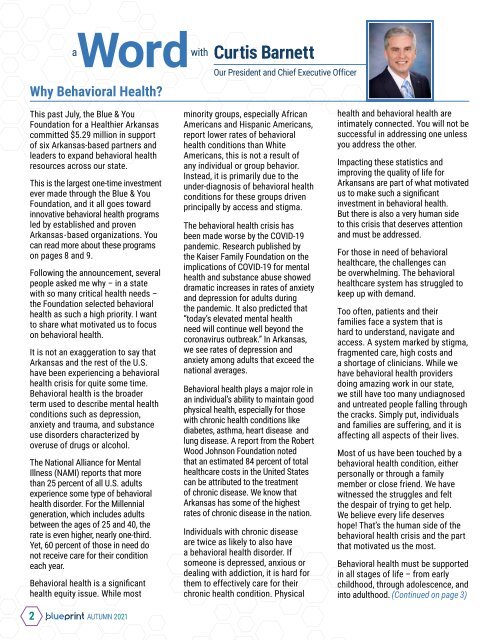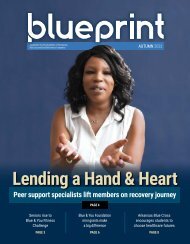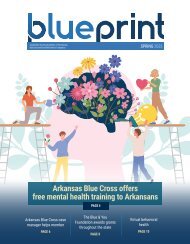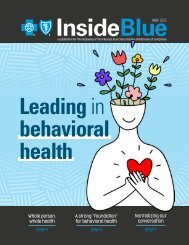Blueprint Autumn 2021
You also want an ePaper? Increase the reach of your titles
YUMPU automatically turns print PDFs into web optimized ePapers that Google loves.
aWordwith Curtis Barnett<br />
Our President and Chief Executive Officer<br />
Why Behavioral Health?<br />
This past July, the Blue & You<br />
Foundation for a Healthier Arkansas<br />
committed $5.29 million in support<br />
of six Arkansas-based partners and<br />
leaders to expand behavioral health<br />
resources across our state.<br />
This is the largest one-time investment<br />
ever made through the Blue & You<br />
Foundation, and it all goes toward<br />
innovative behavioral health programs<br />
led by established and proven<br />
Arkansas-based organizations. You<br />
can read more about these programs<br />
on pages 8 and 9.<br />
Following the announcement, several<br />
people asked me why – in a state<br />
with so many critical health needs –<br />
the Foundation selected behavioral<br />
health as such a high priority. I want<br />
to share what motivated us to focus<br />
on behavioral health.<br />
It is not an exaggeration to say that<br />
Arkansas and the rest of the U.S.<br />
have been experiencing a behavioral<br />
health crisis for quite some time.<br />
Behavioral health is the broader<br />
term used to describe mental health<br />
conditions such as depression,<br />
anxiety and trauma, and substance<br />
use disorders characterized by<br />
overuse of drugs or alcohol.<br />
The National Alliance for Mental<br />
Illness (NAMI) reports that more<br />
than 25 percent of all U.S. adults<br />
experience some type of behavioral<br />
health disorder. For the Millennial<br />
generation, which includes adults<br />
between the ages of 25 and 40, the<br />
rate is even higher, nearly one-third.<br />
Yet, 60 percent of those in need do<br />
not receive care for their condition<br />
each year.<br />
Behavioral health is a significant<br />
health equity issue. While most<br />
minority groups, especially African<br />
Americans and Hispanic Americans,<br />
report lower rates of behavioral<br />
health conditions than White<br />
Americans, this is not a result of<br />
any individual or group behavior.<br />
Instead, it is primarily due to the<br />
under-diagnosis of behavioral health<br />
conditions for these groups driven<br />
principally by access and stigma.<br />
The behavioral health crisis has<br />
been made worse by the COVID-19<br />
pandemic. Research published by<br />
the Kaiser Family Foundation on the<br />
implications of COVID-19 for mental<br />
health and substance abuse showed<br />
dramatic increases in rates of anxiety<br />
and depression for adults during<br />
the pandemic. It also predicted that<br />
“today’s elevated mental health<br />
need will continue well beyond the<br />
coronavirus outbreak.” In Arkansas,<br />
we see rates of depression and<br />
anxiety among adults that exceed the<br />
national averages.<br />
Behavioral health plays a major role in<br />
an individual’s ability to maintain good<br />
physical health, especially for those<br />
with chronic health conditions like<br />
diabetes, asthma, heart disease and<br />
lung disease. A report from the Robert<br />
Wood Johnson Foundation noted<br />
that an estimated 84 percent of total<br />
healthcare costs in the United States<br />
can be attributed to the treatment<br />
of chronic disease. We know that<br />
Arkansas has some of the highest<br />
rates of chronic disease in the nation.<br />
Individuals with chronic disease<br />
are twice as likely to also have<br />
a behavioral health disorder. If<br />
someone is depressed, anxious or<br />
dealing with addiction, it is hard for<br />
them to effectively care for their<br />
chronic health condition. Physical<br />
health and behavioral health are<br />
intimately connected. You will not be<br />
successful in addressing one unless<br />
you address the other.<br />
Impacting these statistics and<br />
improving the quality of life for<br />
Arkansans are part of what motivated<br />
us to make such a significant<br />
investment in behavioral health.<br />
But there is also a very human side<br />
to this crisis that deserves attention<br />
and must be addressed.<br />
For those in need of behavioral<br />
healthcare, the challenges can<br />
be overwhelming. The behavioral<br />
healthcare system has struggled to<br />
keep up with demand.<br />
Too often, patients and their<br />
families face a system that is<br />
hard to understand, navigate and<br />
access. A system marked by stigma,<br />
fragmented care, high costs and<br />
a shortage of clinicians. While we<br />
have behavioral health providers<br />
doing amazing work in our state,<br />
we still have too many undiagnosed<br />
and untreated people falling through<br />
the cracks. Simply put, individuals<br />
and families are suffering, and it is<br />
affecting all aspects of their lives.<br />
Most of us have been touched by a<br />
behavioral health condition, either<br />
personally or through a family<br />
member or close friend. We have<br />
witnessed the struggles and felt<br />
the despair of trying to get help.<br />
We believe every life deserves<br />
hope! That’s the human side of the<br />
behavioral health crisis and the part<br />
that motivated us the most.<br />
Behavioral health must be supported<br />
in all stages of life – from early<br />
childhood, through adolescence, and<br />
into adulthood. (Continued on page 3)<br />
2 AUTUMN <strong>2021</strong>

















